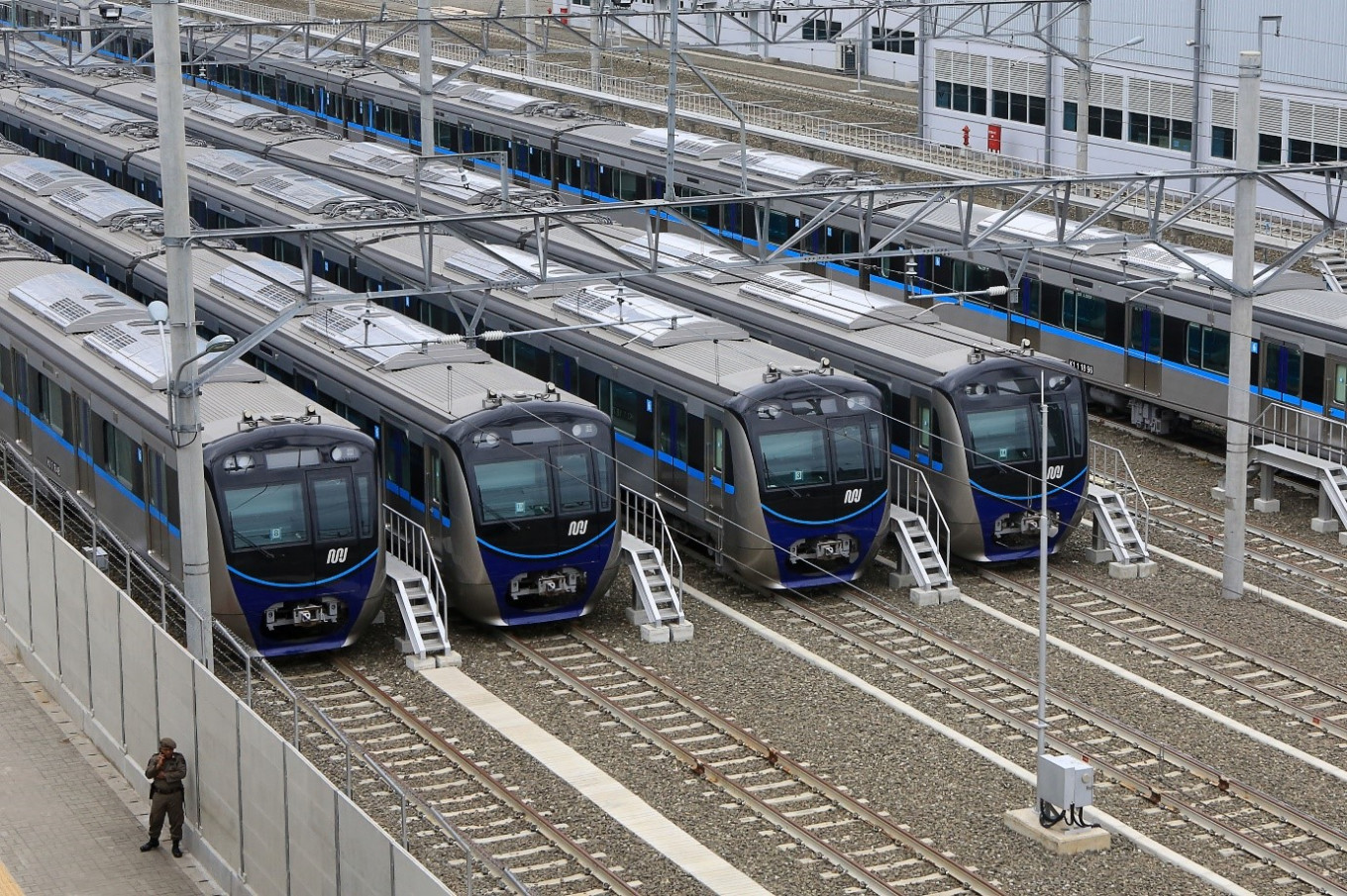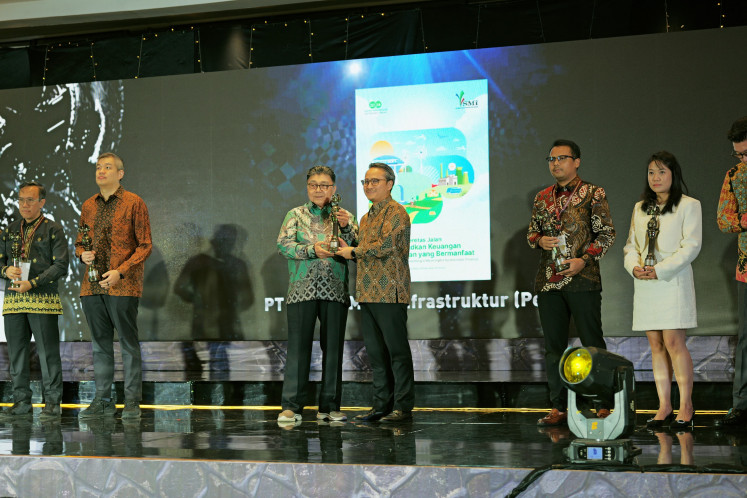Popular Reads
Top Results
Can't find what you're looking for?
View all search resultsPopular Reads
Top Results
Can't find what you're looking for?
View all search resultsDGT carries out budgetary and regulatory function to bolster national economic recovery
Change text size
Gift Premium Articles
to Anyone
L
ess than two years after President Joko “Jokowi” Widodo issued Presidential Decree No. 17/2023 on the declaration of the end of the COVID-19 pandemic, economic activities have returned to normal despite lingering geopolitical tensions and a global economic slowdown.
Reflecting on the government’s road to economic recovery from the severe impact of the COVID-19 pandemic, we well remember how the government responded to the pandemic by rolling out the National Economic Recovery (PEN) Program in 2020, with the Directorate General of Taxation (DGT) of the Ministry of Finance playing a substantive role in this regard.
“The COVID-19 pandemic did not deter the government from taking continuous steps to grow the economy to maintain the fulfillment of national needs,” Dwi Astuti, director of counseling, services and public relations at the DGT, said.
She added that the DGT whose task was to collect state revenue shouldered increasingly bigger tasks and responsibilities. “We had to face extraordinary conditions that paralyzed performance among diverse sectors. Economic activities slid sharply, which in turn caused tax objects to drop drastically. And yet, on the other hand, in 2021 when the pandemic had yet to end, the DGT managed to exceed the tax revenue target”.
In 2020, Indonesia's economy contracted 2.07 percent but gradually recovered to achieve stable annual growth of around 5 percent by 2022-2023.
“Taxation is the tip of economy. Declining economic activities will have a direct effect on the amount of taxes collected. Currently, 73 percent of Indonesia’s state budget is financed by taxes. Achieving the tax revenue target reflects the economic recovery in Indonesia,” said Dwi Astuti.
She acknowledged that the stalling economy as a result of the COVID-19 pandemic had a significant effect on tax revenue.
“However, it should be borne in mind that apart from their budgetary function, taxes also carry out regulatory functions under which taxes can be used as a tool to govern national economic movement by implementing policies that ensure the economy moves on,” she said.
In this context, the DGT has implemented several policies under the PEN program in response to the COVID-19 pandemic.
“For example, the implementation of the final income tax at 0.5 percent attracted more than 240,000 taxpayers”.
Dwi Astuti revealed that Article 21 income tax (PPh) was borne by the government, with Rp 40 trillion (US$2.57 billion) allocated for the purpose, which benefited more than 131,000 taxpayers.
Apart from that, the government also bore final income tax, especially for construction services, and this was not counted as non-taxable revenue.
“More than 14,000 payers of Article 22 import tax were exempted from paying the tax as the government allocated Rp 15 trillion for this tax,” she said.
The DGT also set a policy of reducing by 50 percent Article 25 income tax, amounting to Rp 14 trillion. “More than 66,000 taxpayers benefited from this policy,” she said.
According to Dwi Astuti, the government also allocated Rp 5.8 trillion to return the advanced excess of the value added tax (VAT) payment for taxpayers that met the particular requirements. “The program benefited 4,000 taxpayers,” she said.
Dwi Astuti further noted that the PEN was more than just a short-term program to tackle the COVID-19 pandemic, but a long-term program. Under PEN, the government allocated Rp 1,895.61 trillion for the three-year-program starting in 2020.
The short-term goal of PEN was to ensure the sustainability of businesses severely affected by the COVID-19 pandemic. On top of that, PEN also served as an easing of economic turmoil during the COVD-19 pandemic.
PEN helped ensure the recovery of the national economy related to health, social protection, business incentives, MSME (micro, small and medium enterprises) support, corporate financing and regional administration and ministries/institutions by sector.
With the PEN program related to various fields, business actors not only withstood the economic turmoil, but also sustained their businesses.
According to Dwi Astuti, several policies that the government had enacted remained effective to support the PEN program. They included the government-borne value added tax (PPN DTP) on the transfer of landed houses and apartment units by the end of 2024, as set out in PMK No. 61/2024.
Under the PMK, the purchase of a landed house or apartment worth Rp 5 billion was required to pay the VAT at a maximum of Rp 220 million.
“The PMK revised the previous PMK No. 7/2020. Under the previous regulation, the submission of an acceptance of official report regarding the transfer on July 1, 2024 until Dec. 31, 2024, was given 50 percent PPN DTP relief. With PMK No. 61/2024 put into force, the transfer starting Sept. 1 until Dec. 31, 2024 was given 100 percent PPN DTP relief,” she said.
Dwi Astuti said further that looking ahead, the directorate general would continue to increase the budgetary function, especially with regard to the new government’s planned poverty alleviation through the provision of the free nutritious meals program for school children and self-sufficiency in food and energy.
The planned provisions of the free meals program and self-sufficiency in food and energy are among the economic and social issues that President Prabowo Subianto addressed in his inaugural speech on Oct. 20, as part of his larger goal of building a more prosperous nation.
The DGT would implement policies that support these poverty alleviation programs by, for example, implementing a progressive income tax rate for individuals, according to Dwi Astuti.
Taxation will also function to boost Indonesia’s competitiveness. “Self-sufficiency in food and energy will be the primary steps that Indonesia will take to respond to an increasingly complex global challenge. DGT will support the agenda,” she said.
Thus, with its regulatory function, the DGT has contributed to the economic resilience that Indonesia has demonstrated over the past few years.
Source: The Directorate General of Taxation (DGT)











